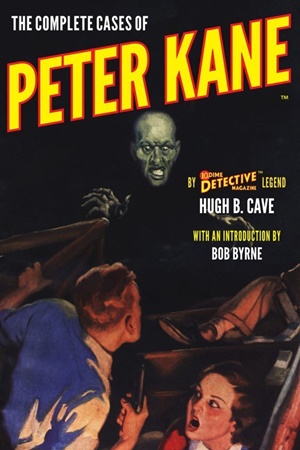 “You’re the second guy I’ve met within hours who seems to think a gat in the hand means a world by the tail.” – Phillip Marlowe in Raymond Chandler’s The Big Sleep
“You’re the second guy I’ve met within hours who seems to think a gat in the hand means a world by the tail.” – Phillip Marlowe in Raymond Chandler’s The Big Sleep
(Gat — Prohibition Era term for a gun. Shortened version of Gatling Gun)
Matt Moring of Steeger Books (and Altus Press, and Black Mask, and…) allowed me to write the introduction to Hugh B. Cave’s The Complete Cases of Peter Kane. Matt has kindly let me reproduce that intro as an entry here for A (Black) Gat in the Hand.
Hugh B. Cave was the last of the great pulpsters. From hundreds of short stories in the pulp magazines of the thirties, to his final novel in 2004, Cave wrote over a thousand shorts and over three dozen novels. He was also a war reporter and later even owned and managed a coffee plantation in Jamaica.
While H.P. Lovecraft, Clark Ashton Smith, August Derleth and Robert E. Howard are better remembered for weird menace/horror stories, Cave is worthy of standing alongside them. But early in his career, Cave also wrote extensively in the mystery field.
He was one of the few to write for the last three (named) editors of the king of mystery pulps, Black Mask: the legendary Joseph ‘Cap’ Shaw, Fanny Ellsworth and Kenneth S. White.
Black Mask’s major competition came in the form of Dime Detective Magazine, which touted itself as “twice as good – for half the price” (Black Mask cost 20 cents at the time; though the price would shortly drop to 15 cents, in part due to Dime Detective’s success at the cheaper cost).
Editor Kenneth White (the same mentioned above) was instructed to lure as many writers from Black Mask as he could, paying an extra penny a word as enticement. And with a going rate of one to two cents for pulp writers (Black Mask’s three cents a word was indicative of its standing and quality in the field), the four cent rate made a significant difference to writers. As the prolific Erle Stanley Gardner supposedly replied to observations that he always seemed to use his hero’s last bullet to knock off the story’s antagonist:
“At three cents a word, every time I say ‘Bang’ in the story I get three cents. If you think I’m going to finish the gun battle while my hero still has fifteen cents worth of unexploded ammunition in his gun, you’re nuts.”
Writers were forbidden from doing novel serializations (The Maltese Falcon was first a serial) and were also instructed to create their own characters, which could not appear elsewhere, for the magazine. The onslaught was successful, with many of the era’s most popular writers switching to Dime Detective. Carroll John Daly (who brought the iconic Race Williams with him), Erle Stanley Gardner, Frederick Nebel and Norbert Davis (whose humorous stories were frequently rejected by Shaw but who flourished at his new home) were among those lured to Dime Detective.
…
Read More Read More

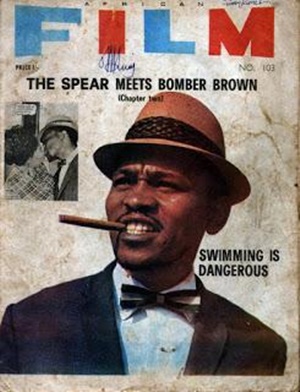
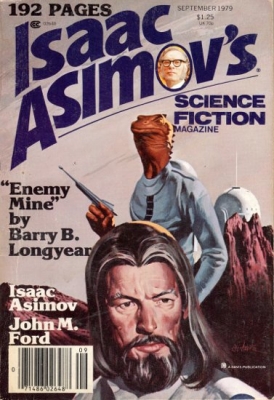
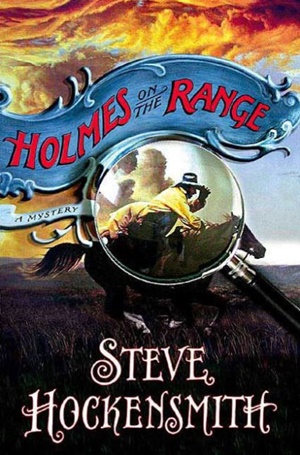
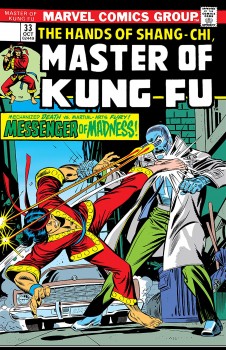
![1962-01-31 [Pittsfield MA] Berkshire Eagle 1 pedipulator headline](https://www.blackgate.com/wp-content/uploads/2019/08/1962-01-31-Pittsfield-MA-Berkshire-Eagle-1-pedipulator-headline.jpg)
![1962-07-24 Allentown [PA] Morning Call 21 pedipulator illus cropped - Copy](https://www.blackgate.com/wp-content/uploads/2019/08/1962-07-24-Allentown-PA-Morning-Call-21-pedipulator-illus-cropped-Copy.jpg)


 July 17 for me was a day of rest and running errands; then for my first film at Fantasia on July 18 I went to the De Sève Theatre to watch Maggie (메기). Directed by Yi Ok-seop from a film she wrote with star Koo Kyo-hwan, it’s the story of Yeo Yoon-young (Lee Ju-young), and her boyfriend Sung-won (Koo). Yoon-young’s a nurse at Love of Maria Hospital in Seoul. One day, an X-ray surfaces showing a man and a woman having sex in the X-ray room. The next day almost nobody comes in to work; the X-ray room’s a popular site for assignations, and everyone thinks they’re one of the figures in the X-ray. Yoon-young’s the only one who dares show her face, along with Doctor Lee (Moon So-ri). They end up forming an unlikely partnership as Maggie helps Lee learn to trust other people. Meanwhile, Sung-won finds work filling in sinkholes opening up in Korea, following an earthquake predicted by a catfish named Maggie — who also turns out to play an important role within the film.
July 17 for me was a day of rest and running errands; then for my first film at Fantasia on July 18 I went to the De Sève Theatre to watch Maggie (메기). Directed by Yi Ok-seop from a film she wrote with star Koo Kyo-hwan, it’s the story of Yeo Yoon-young (Lee Ju-young), and her boyfriend Sung-won (Koo). Yoon-young’s a nurse at Love of Maria Hospital in Seoul. One day, an X-ray surfaces showing a man and a woman having sex in the X-ray room. The next day almost nobody comes in to work; the X-ray room’s a popular site for assignations, and everyone thinks they’re one of the figures in the X-ray. Yoon-young’s the only one who dares show her face, along with Doctor Lee (Moon So-ri). They end up forming an unlikely partnership as Maggie helps Lee learn to trust other people. Meanwhile, Sung-won finds work filling in sinkholes opening up in Korea, following an earthquake predicted by a catfish named Maggie — who also turns out to play an important role within the film.